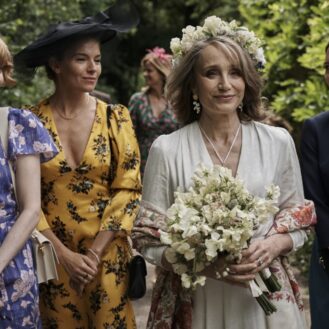Israeli filmmaker Shimon Dotan’s previous efforts have earned him recognition in his home country, where he has won nine Israeli Academy Awards for his work as a writer, producer, and director. Though most of his films are narrative-based, the documentary Hot House (2006) earned acclaim when it premiered at the Sundance Film Festival.
With his latest film, The Settlers, Dotan returns to the documentary genre. Investigating the origin, history, and lived reality of illegal Isreali settlements in the occupied territory of Palestine’s West Bank. The Settlers is a beautifully shot, thoughtfully articulated portrait of communities, politics, and faith.
Wylie Writes’ Shannon Page had the opportunity to speak with Dotan about his latest film and about the experience of shooting in the West Bank settlements.
Shannon Page: What was the most surprising detail you learned about the people living in the West Bank settlements during the making of the film?
Shimon Dotan: Everything was new and surprising. There is a division in Israel: most Israelis do not cross the green line into the West Bank and do not visit the settlers. At the same time, they do not have any real dialogue or encounter with settlers. Of course, this is a generalization. I am not saying that this is always the case, but it appears as a topic of division among Israelis.
As I became more intimate with many of the settlers and as I witnessed what had happened on the ground, I was quite surprised. I was terribly surprised by the depth of the convictions of those who are more on the extreme side. I was absolutely surprised to find out that 80%, not less, out of the 400,00 settlers are there for economic reasons – nothing to do with ideology or religion. I was surprised to find – among many of the settlers – people who tried to create, which seems – to me – to be impossible when relations with Palestinians are near them. So, it was full of surprises and contradictions, but at the foundation of it all is a situation that, in my view, is unsustainable. Israel cannot keep 400,000 of its citizens in the midst of 2.8 million Palestinians without reaching a resolution that will satisfy both sides.
SP: How did the idea for the film begin? Can you talk a bit about the development of the project?
SD: I normally do narrative films. About nine years ago, I did my first documentary. It’s called Hot House, and it’s about Palestinian prisoners in Israeli jails. I travelled through the West Bank. That’s when I met the settlers and settlements up-close for the first time. It became clear to me right away that I must make a film about that.
It took some time until I saw that I had an angle of entry into the topic, which often seems to be the most difficult thing to reach. At first, I thought I was going to just travel in the West Bank to the settlements, and film what I saw and compose it into a film. But when I started off, it became very clear to me that this would result in a very limited, and probably even misleading, representation of the settler phenomenon.
I decided to add more history. I started with the establishment of the settlements and the evolution. I ended up with a film which has three pillars: one is the history of the settlements, the second is the ideological and religious forces that drove the early settlers and keep driving them today, and the third is the reality on the ground as I see it now.
SP: The film features interviews with leaders and founders of settlement movement, as well as with those who were born in the settlements. Were most people willing to be interviewed, or did you face some resistance?
SD: For sure, there was a lot of resistance. It took some time, actually, to get to many of the settlers. After I got a few of the leaders that were willing to talk to me, it became much easier with the others, but the suspicion was there. There is a general suspicion that the media, so to speak, is against them. In the end, I got to almost everyone that I wanted to talk to, but it was a process. I had to go over some hurdles. I must also note that I did make a point with every person that I talked to on camera to make it clear to them that I am opposing the settlement enterprise. I did not want to “steal”, so to speak, any interview or to mislead them. I found that it was a catalyst for a deeper and more meaningful conversation.
SP: They appreciated you being so upfront about your own position?
SD: Yes, I think so. At the same time, some of them thought that they might try to convert me. It created a good dialogue, but I was genuinely interested to hear what they had to say.
SP: What do you hope that audiences will take away from The Settlers?
SD: I hope they will be informed. I don’t think that anyone who cares about Israel, or who is Israeli, can risk not being fully informed about the settlements. And the result, I hope, is that they will be opinionated. We just cannot let this whole issue fall asleep, because if we are less prepared, it will blow up in our face.
The Settlers returns to Toronto’s Hot Docs Ted Rogers Cinema on Monday, April 24 and Wednesday, April 26.
**********
Do You Tweet? Follow:
Shannon Page: @ShannonEvePage







Be the first to comment